EPA Ignores Climate Dangers
Air Date: Week of June 27, 2025
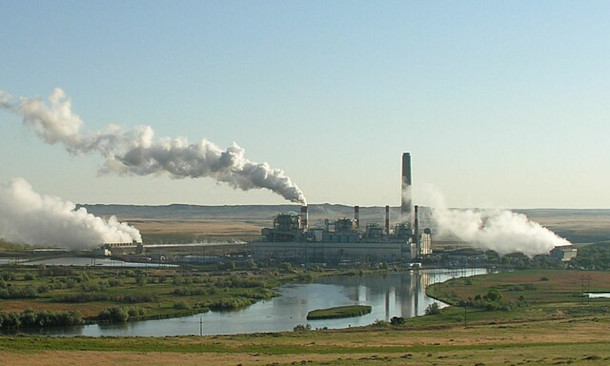
Fossil fuel-fired power plants are one of the biggest emitters of greenhouse gasses in the United States. Above, a coal-fired plant in central Wyoming. (Photo: Greg Goebel, Wikimedia Commons, CC BY-SA 2.0)
This June the US Environmental Protection Agency proposed eliminating regulations that limit climate changing gases from power plants, about a quarter of US emissions. Harvard Law Professor Richard Lazarus, an environmental and constitutional law scholar and author of The Rule of Five: Making Climate History at the Supreme Court, speaks with Host Steve Curwood about the perils of the broader Trump administration effort to weaken federal environmental protections.
Transcript
DOERING: From PRX and the Jennifer and Ted Stanley Studios at the University of Massachusetts, Boston, this is Living on Earth. I’m Jenni Doering.
CURWOOD: And I’m Steve Curwood.
Record summer heat is scorching the northern hemisphere around the world from Japan and China to Europe and North America. Blistering heat waves in the US have already smashed records from Minneapolis to Boston to Philly with “dangerous” heat index numbers. Records will likely keep getting broken as steadily increasing emissions of greenhouse gases continue to overheat the planet. But the Trump Administration’s Environmental Protection Agency no longer wants to use its authority to do something about the climate crisis. This June the EPA proposed eliminating regulations that limit climate changing gases from power plants, about a quarter of US emissions. Here to explain is Harvard Law Professor Richard Lazarus, an environmental and constitutional law scholar and author of The Rule of Five: Making Climate History at the Supreme Court. Professor Lazarus, welcome back to Living on Earth!
LAZARUS: Wonderful to be here, Steve, always fun to join you in conversation.
CURWOOD: Great to have you here. So Professor, what was your initial reaction to the EPA's proposal to roll back rules for CO2-emitting power plants?
LAZARUS: Oh, I mean, obviously it's devastatingly sad, but it's no surprise, right? We have a president who campaigned on it, and we have an EPA administrator who, a few months ago, said that his goal was to basically put a dagger in the heart of climate change religion. So by the time this latest proposals came out, we were ready and steeled for it, but still in the greater arc of things, it's discouraging. Climate change is not going away, and every day we lose in addressing it makes it exponentially harder to do anything about it.
CURWOOD: Indeed. Now, this decision flies in the face of, I guess, what's called the endangerment finding by the EPA back in the day, which was based on a Supreme Court case called Massachusetts versus the Environmental Protection Agency. Please give us a brief overview of the case and the endangerment finding.
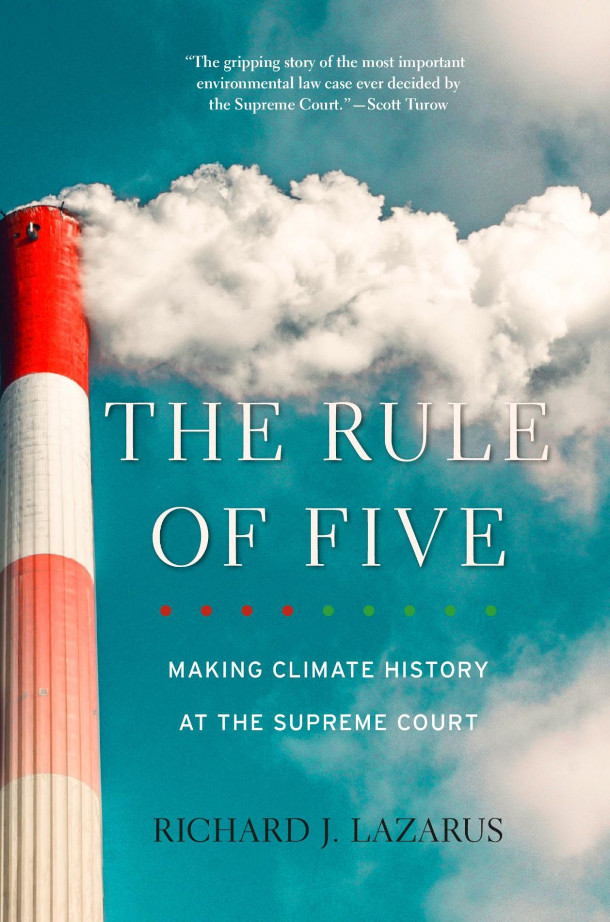
Richard Lazarus is the author of “The Rule of Five: Making Climate History at the Supreme Court.” It takes a look at the landmark environmental case Massachusetts v. EPA, which decided that greenhouse gasses are air pollutants and therefore could be regulated under the Clean Air Act. (Photo: Courtesy of Richard Lazarus)
LAZARUS: So in Massachusetts versus EPA, the EPA, under the Bush administration, had declined to make an endangerment finding. They didn't say greenhouse gasses didn't endanger public health and welfare. They said, we're not going to decide that issue. What this us, Supreme Court did in Massachusetts, EPA is they first said, very importantly, for the first time ever, greenhouse gasses are air pollutants within the meaning of the Clean Air Act. That's actually the central holding of the case, because before that, their EPA had never regulated them. Under the Bush administration, they said they're not air pollutants. So for the first time that the Court said, "No, they are air pollutants, they come under the rubric of the statute." The next question the court answered was whether EPA was right in saying we're not going to decide whether they endanger public health and welfare. And the court said, "The reason you've given for not deciding, they're invalid," and they sent it back to EPA. They didn't tell EPA they had to find they endangered public health and welfare. They didn't even tell EPA, as part of a compromise from the court, that they had to make a finding. They simply said, "The reasons you gave weren't legally valid." So went back to EPA. The Bush administration did nothing. They sat on it. This is George W. Bush, but then during the Obama Administration, this what you alluded to before, the Obama Administration, December 2009 at the end of the first year, EPA took that big step. And they made a formal finding the emission of greenhouse gasses can be reasonably anticipated to endanger public health and welfare, and when that happens, that triggers all the arsenal of the Clean Air Act now for climate change.
CURWOOD: So what would it mean for the EPA to be successful in going back on such a historic decision?
LAZARUS: Well, if they were successful in making a finding upheld by the courts, the admission to greenhouse gasses cannot reasonably anticipated to endanger public health welfare. That would end regulation greenhouse gasses under the Clean Air Act. And the Clean Air Act is our only federal tool for regulating greenhouse gasses. So whether it's airplanes, cars, power plants, landfills, oil and gas exploration, all of which emit greenhouse gasses, all that Clean Air Act regulation would end simultaneously.
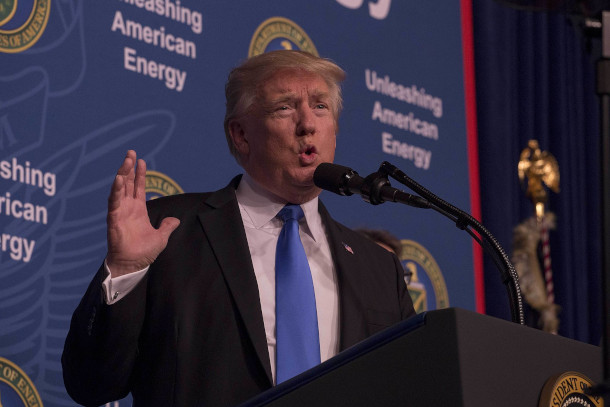
President Trump was unsuccessful in reversing Clean Air Act regulation of fossil fuels during his first term in 2016. While Lazarus was unphased by these initial threats, he says his concerns are growing after the EPA’s latest proposal. Above, Trump gives remarks at a 2017 Unleashing American Energy event. (Photo: Simon Edelman, Wikimedia Commons, Public Domain)
CURWOOD: So from your perspective, as a lawyer, as a law professor, how likely is it that the Trump Administration's EPA will succeed in making such a reversal?
LAZARUS: Well, I will tell you, when I first heard they were contemplating this, they didn't do it in the first administration, my reaction was, make my day. In other words, try to challenge it, because you'll be wasting your time. I'll have to tell you, in a Trump 2.0, my thinking has evolved, and I'm more concerned. And let me explain why. The science hasn't changed at all. There's no question that greenhouse gas emissions endanger public health and welfare. The question is whether the Trump Administration can find some hook, some statutory hook, some technical error. The EPA, they'll allege made in making those findings and use it to unravel it. The science is no less clear. So let me tell you what they're doing, so far. They've made the announcement they're going after the endangerment finding, and I think they will, but they haven't done it yet. What they've done is something that leads up to it, and that is they've said we're no longer to regulate greenhouse gas emissions from power plants, which is a major source of greenhouse gasses. And they haven't done it by saying they're going to withdraw the engagement funding. They've done it by saying to regulate those power plants, EPA must make a decision in the administrator's judgment that greenhouse gas emissions from power plants may be significantly contribute to air pollution that may reasonably anticipate endanger public health and welfare. So they're not going after the endangerment finding yet itself. They're saying it requires significant contribution, and here they're playing some games with precedent and language. So they're not really going after the science. They're going after what “significantly” means in the statute. They're trying to make this a question of law.
CURWOOD: And from your perspective, how successful will they be at picking this nit?
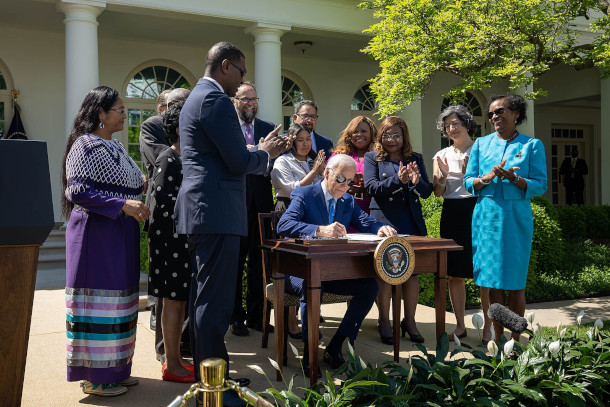
Former President Biden made significant moves towards advancing environmental justice during his presidency, Lazarus comments. Above, Biden signs the Executive Order “Revitalizing Our Nation’s Commitment to Environmental Justice for All” in April 2023. (Photo: Official White House Photo by Cameron Smith, Wikimedia Commons, Public Domain)
LAZARUS: Well, I hope they're not successful. I'll tell you what the argument is and why I still worry. I wouldn't have worried eight, nine years ago. They're going to argue the word significantly is a word to which means it's got to be important, and a word which the administrator gets a lot of discretion in deciding whether it's met or not, and they're going to say it's not met because significance is a policy determination, and that allows the administrator to consider costs. And here, the administrator is going to decide that significant depends upon whether or not you can show that reducing greenhouse gas emissions by a certain percentage from power plants will affect climate change worldwide. And given how much emissions are worldwide, the power plants only consist of now 3.5% because they've gone down a lot, they say, look at such a small percentage, and you're not going to reduce it to zero. So we don't think that's significant. I think that argument should lose, clearly. Power plants are one of the largest sources in the United States that meets I think any fair definition as significant. But here's what worries me, Steve. I'm not worried about the DC Circuit. They'll hear the case first. I worry about the United States Supreme Court. In the last several years, in case after case after case, the United States Supreme Court has ruled against environmentalists in sweeping opinions. They don't seem to buy in to the importance of these laws and the things they've successfully done for the past 50 years. So I'm worried when I shouldn't have to be worried, but it makes me worried.
CURWOOD: So I mean, across the board, it sounds like the Trump administration is just trying to throw pretty much any regulation under the bus that they feel gets in the way of business. Or am I overstating?
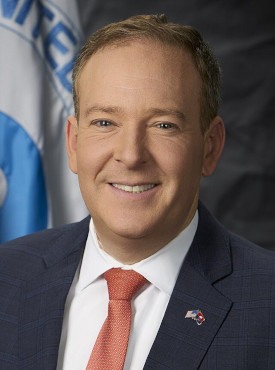
Lee Zeldin was President Trump’s pick for EPA Administrator and has held the position since January 2025. Under Zeldin’s rule, the agency has committed to fulfilling Trump’s promise to “unleash American energy,” largely through deregulation of existing Obama and Biden-era legislation. (Photo: Environmental Protection Agency, Wikimedia Commons, Public Domain)
LAZARUS: Unfortunately, you're not overstating it. It's astounding what the Trump Administration has done. Day one, Executive Order Unleashing America's Energy targeted all the climate change regulation. They're trying to eliminate not just existing regulations, like every single one, but they're doing more than that. Even more troubling than that, they're trying to eliminate the EPA bureaucracy, the career employees, the scientists, the engineers, the economists. They're the ones who write the regs. They're the ones who do the work, the political officials, the few that come in, whether it's Obama, Biden or Trump or Bush, they come and go. The career people who are the ones who are the real experts on this, and the biggest tragedy of the Trump administration is to try and destroy that expertise. If they succeed, that'll make it very harder three years from now, if there's a more favorable administration, to put Humpty, Dumpty back together again. That's my biggest worry.
CURWOOD: Now, they would argue that, look, all these rules and regulations get in the way of economic progress, that people need jobs, they need to make money, to support communities, and that they're there to make the change that the voters told them to make.
LAZARUS: Yeah, I mean, I know you're right. I know they'll make that argument. It really is not an argument that can hold up. The fact is, we've had these tough laws for 50 years, and our economy has not cratered. Our economy has boomed, and we've had both economic growth and environmental protection. And the United States, we now have a gazillion dollar pollution control industry. We have 1000s of jobs which depend upon these statutes. We have property values which depend upon these statutes. So at this point, it's completely backwards to say that climate change regulation is inconsistent with economic growth. It is necessary for economic growth, and if Trump's policies prevail, our economy will pay the price for it.
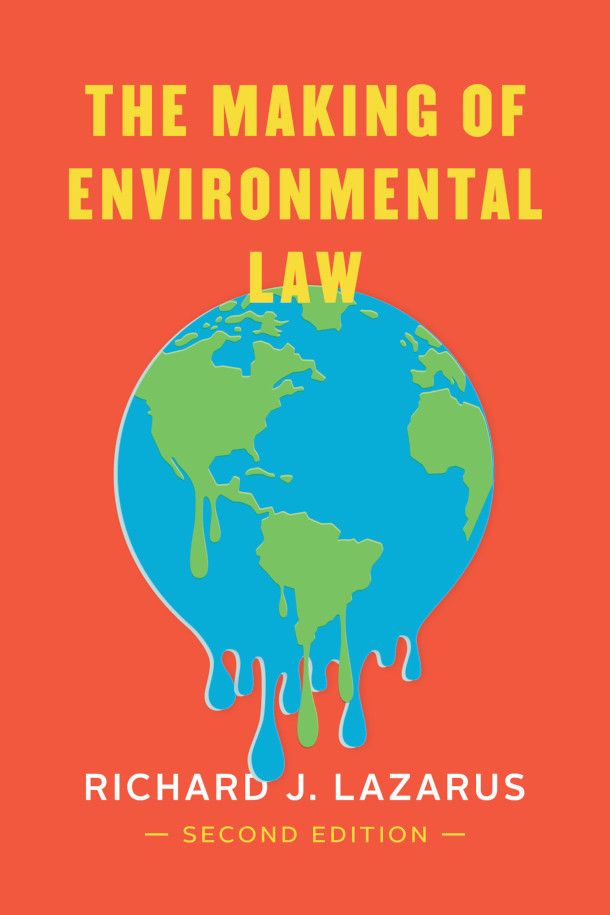
Lazarus’s latest book, the second edition of “The Making of Environmental Law,” discusses the emergence of environmental law in the United States, its evolution, and the unique challenges it faces today. (Photo: Courtesy of Richard Lazarus)
CURWOOD: By the way, many of the Biden-era regulations for the environment were designed to advance environmental justice. What do you make of the Trump Administration and its efforts to cut funding from EJ programs and close such offices altogether? How does this proposal fit in the bigger picture?
LAZARUS: Well, it's tragically sad. Environmental justice is very simple. It's simply saying, "Put your resources where the problems are greatest." And that historically, we hadn't done that. Historically, government, including EPA, even when well-meaning, they had not paid adequate attention to the fact that pollution tends to go to the places least able to resist the powerful economic forces which are looking for the path of least resistance. And they were time and time again, poor communities in the country and communities of color. There's a racial dimension to this, too. And the lesson of environmental justice was, unless you actually proactively look for that possibility, you're going to repeat it on and on. So the Biden Administration, more than any other, knew that, and they said, "We're going to target those areas." It's actually figuring out where the biggest problems are, where the least enforcement is happening, where the standards are being ignored, and making sure they receive their fair share of a broader regulation. Make sure they receive their fair share of the resources needed to address the climate problems happening right now. It was an entirely sensible approach and the best we had ever done. And it's really a tragedy to have them go after it as well.
CURWOOD: You're a professor at Harvard Law School, and you're tasked with educating the next generation of environmental lawyers, but what's going on right now is certainly unprecedented. What are you telling your students as they head into this uncertain future?
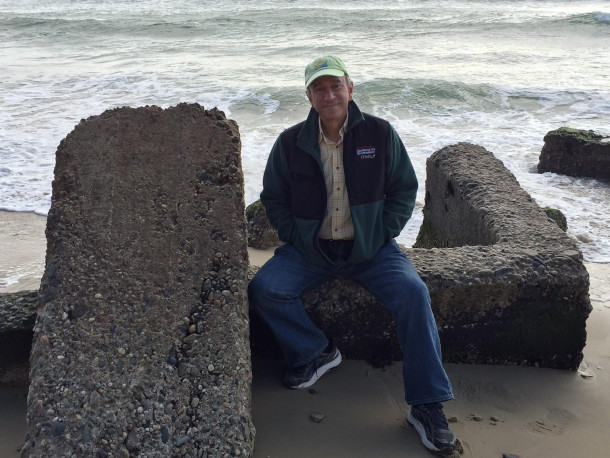
Richard Lazarus is the Charles Stebbins Fairchild Professor of Law at Harvard University, where he specializes in teaching environmental law. (Photo: Courtesy of Richard Lazarus)
LAZARUS: It's a great question. I'll tell you, there's a lot for someone like me who's devoted my life to these issues to be discouraged about right now, to see so much successful environmental law be unraveled for irrational reasons. The one joy I get these days are these students. They are what gives me hope, because they're in my classrooms. They're ambitious. They want good things. They want to change the world, want to address climate issues and other issues which are really important. They come here, and they're smart. And more important to me than smart — smarts are a dime a dozen — they're hard workers. And basically what I tell them these days is the following: This is your time. Pick yourself up. You may be very discouraged by things, but this is your time. Pick yourself up and get to work. You wanted to make a difference on enviornmental issues? You wanted to make a difference on climate change? Well, guess what? We need you. The country and the world needs you now more than ever. This is not the time to sit back and be despondent. This is a time to work hard because we need you. You didn't get the benefit of being able to be passive and say, I'll sit back and enjoy the environment and take hikes. If you want to make a difference, you've got to work hard, you've got to be focused, you have to be strategic, and you have to be strong and steely and resilient, because a lot of political forces are going to be working against you. And they're hopeful. I think their time horizon a little bit different than mine because they're pretty young. They've got about, you know, 50 years on me. They're more likely to see Trump on what he's doing, as something, yeah, they'll live past it and they'll be ready to go.
CURWOOD: Harvard Law professor Richard Lazarus is the author of The Rule of Five: Making Climate History at the Supreme Court. Thanks so much for taking the time with us.
LAZARUS: Thank you, Steve, always a pleasure.
Links
Read Richard Lazarus’ Harvard faculty page
Learn More About the Rule of Five
Living on Earth | "Court Catalyzes Climate Action"
Living on Earth | The Rule of Five: Making Climate History at the Supreme Court
Living on Earth wants to hear from you!
Living on Earth
62 Calef Highway, Suite 212
Lee, NH 03861
Telephone: 617-287-4121
E-mail: comments@loe.org
Newsletter [Click here]
Donate to Living on Earth!
Living on Earth is an independent media program and relies entirely on contributions from listeners and institutions supporting public service. Please donate now to preserve an independent environmental voice.
NewsletterLiving on Earth offers a weekly delivery of the show's rundown to your mailbox. Sign up for our newsletter today!
 Sailors For The Sea: Be the change you want to sea.
Sailors For The Sea: Be the change you want to sea.
 The Grantham Foundation for the Protection of the Environment: Committed to protecting and improving the health of the global environment.
The Grantham Foundation for the Protection of the Environment: Committed to protecting and improving the health of the global environment.
 Contribute to Living on Earth and receive, as our gift to you, an archival print of one of Mark Seth Lender's extraordinary wildlife photographs. Follow the link to see Mark's current collection of photographs.
Contribute to Living on Earth and receive, as our gift to you, an archival print of one of Mark Seth Lender's extraordinary wildlife photographs. Follow the link to see Mark's current collection of photographs.
 Buy a signed copy of Mark Seth Lender's book Smeagull the Seagull & support Living on Earth
Buy a signed copy of Mark Seth Lender's book Smeagull the Seagull & support Living on Earth

